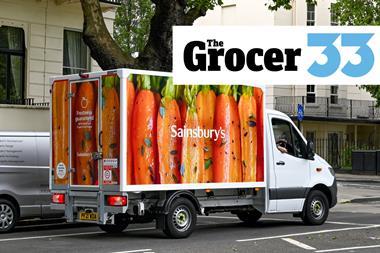They're queuing up at Sainsbury's. It's suddenly on the shopping list of some of the biggest names in private equity with a price tag reportedly topping £11bn.
First, last Friday, a CVC, KKR and Blackstone consortium was forced to reveal its interest in acquiring Britain's third-largest grocer. Next in the queue was a Cinven and Texas Pacific consortium. Delta Two, Permira, Apax and BC Partners have joined the line of interested parties. Even Marks & Spencer is said to be interested.
So, why is Sainsbury's so interesting? Why has it not been put off by the surge in its share price, in the last 18 months, and in the last eight days (see below). "There's now pressure on private equity just to find a focus for their ever-larger capital, rather than any hidden value in Sainsbury's," believes Shore Capital retail analyst Clive Black. "The more they have to invest, the bigger projects must be."
Private equity generally likes to get a return within three to five years and it does so by selling assets, slashing costs and capital expenditure and saddling the company with tax-efficient debt.
City analysts, while professing their amazement at the number of interested parties and the size of the deal (it would be the largest private equity deal in Europe), do not appear convinced. "To reduce borrowing on a deal of this scale, they've got to look at sale and leaseback on the property estate," says Black. "Sainsbury's would then have rent to pay and that would bring its operating margin down to 1-2%. That would make it very vulnerable when it came to responding to any price activity from competitors."
Sainsbury's only owns about half its property - compared with 80% freehold ownership at Tesco and 90% at Morrisons. If it went any further down the leasehold route, said one shareholder, it "would be like selling off the crown jewels".
Improving operating margins would be key to any consortium's plans for Sainsbury's. But the change of focus - following a successful top-line based recovery - may have a negative impact on the Holborn-based retailer, said a senior source at a rival supermarket. "The focus would be on the bottom line, and that may be at the expense of the customer. If Justin King was retained, and rewarded based on profits, there may be a conflict of interest."
Richard Ratner at Seymour Pierce can't see where the gains could be made."In our opinion, it would be difficult to get operating margins up to 4%, and this is only likely to be achieved by a continuation of the existing expansion programme."
Plans to expand non-food rapidly would not be possible, according to one source close to the supermarket, without stealing space from grocery. And that's not what its customers want, he adds.
"Expanding non-food at the expense of food would turn Sainsbury's into something similar to its competitors. It has spent a lot of money and time on expanding the quality food offering. That's what its customers want."
CEO Justin King's three-year recovery plan included non-food, but not until year three. And it was very clear from its research that, unlike Tesco and Asda, the non-food element should be complementary, and of a higher standard, than its larger rivals, with Next and M&S as its competition for clothing and houseware.
Another plank in the plan would be to put a squeeze on suppliers. This may attract attention from the Competition Commission, says Ratner. "By changing settlement times it may well incur the wrath of the Commission."
Pension trustees may also take a dim view of a private equity deal, says David McCarthy, analyst at Citigroup, as a highly leveraged Sainsbury's would increase the risk to the pension portfolio.
A private equity bid would also meet with heavy resistance from the unions. GMB and T&G are lobbying to end the tax breaks for private equity deals, arguing that they were agreed in a bid to encourage start-ups. As the market has developed, private equity has since migrated to deals that, far from being venture-based, are exercises in asset-stripping, it argues.
Will a deal happen? An offer has still to be tabled. Will it work? Analysts are sceptical. "But we cannot discount their determination," says Black. "As we saw with Blackstone's bid to buy United Biscuits, they have the cash and the confidence."n
will he be king?
Halfway through his CEO Justin King's three-year recovery programme, private equity "would be bloody stupid to get rid of him," says Richard Ratner at Seymour Pierce. King stands to net about £10m from a successful takeover but private equity players are thought to be wooing King with deals of up to £100m, based on performance targets.
However, a private equity deal is likely to amount to a complete reversal of King's
Making Sainsbury's Great Again strategy.
"If private equity started throwing in non-food at the expense of groceries, King would have to backtrack," says a source close to Sainsbury's. And a leading supplier believes that Sainsbury's success at developing a strong food offer would be jeopardised by a switch in focus. "King has built a significant platform for great food development by working with suppliers. Suppliers now want to invest their new product development with Sainsbury's. King would not be happy if a new approach to squeeze suppliers jeopardised all his hard work."
King has won many plaudits from the City for doing a good job in turning around Sainsbury so far. Ratner adds: "Justin has taken costs out of head office and cut down the number of distribution centres. Availability has improved, while morale in stores and head office has got a lot better. And the quality of the product has got noticeably better."
But will the cash be too tempting for King to turn down?
First, last Friday, a CVC, KKR and Blackstone consortium was forced to reveal its interest in acquiring Britain's third-largest grocer. Next in the queue was a Cinven and Texas Pacific consortium. Delta Two, Permira, Apax and BC Partners have joined the line of interested parties. Even Marks & Spencer is said to be interested.
So, why is Sainsbury's so interesting? Why has it not been put off by the surge in its share price, in the last 18 months, and in the last eight days (see below). "There's now pressure on private equity just to find a focus for their ever-larger capital, rather than any hidden value in Sainsbury's," believes Shore Capital retail analyst Clive Black. "The more they have to invest, the bigger projects must be."
Private equity generally likes to get a return within three to five years and it does so by selling assets, slashing costs and capital expenditure and saddling the company with tax-efficient debt.
City analysts, while professing their amazement at the number of interested parties and the size of the deal (it would be the largest private equity deal in Europe), do not appear convinced. "To reduce borrowing on a deal of this scale, they've got to look at sale and leaseback on the property estate," says Black. "Sainsbury's would then have rent to pay and that would bring its operating margin down to 1-2%. That would make it very vulnerable when it came to responding to any price activity from competitors."
Sainsbury's only owns about half its property - compared with 80% freehold ownership at Tesco and 90% at Morrisons. If it went any further down the leasehold route, said one shareholder, it "would be like selling off the crown jewels".
Improving operating margins would be key to any consortium's plans for Sainsbury's. But the change of focus - following a successful top-line based recovery - may have a negative impact on the Holborn-based retailer, said a senior source at a rival supermarket. "The focus would be on the bottom line, and that may be at the expense of the customer. If Justin King was retained, and rewarded based on profits, there may be a conflict of interest."
Richard Ratner at Seymour Pierce can't see where the gains could be made."In our opinion, it would be difficult to get operating margins up to 4%, and this is only likely to be achieved by a continuation of the existing expansion programme."
Plans to expand non-food rapidly would not be possible, according to one source close to the supermarket, without stealing space from grocery. And that's not what its customers want, he adds.
"Expanding non-food at the expense of food would turn Sainsbury's into something similar to its competitors. It has spent a lot of money and time on expanding the quality food offering. That's what its customers want."
CEO Justin King's three-year recovery plan included non-food, but not until year three. And it was very clear from its research that, unlike Tesco and Asda, the non-food element should be complementary, and of a higher standard, than its larger rivals, with Next and M&S as its competition for clothing and houseware.
Another plank in the plan would be to put a squeeze on suppliers. This may attract attention from the Competition Commission, says Ratner. "By changing settlement times it may well incur the wrath of the Commission."
Pension trustees may also take a dim view of a private equity deal, says David McCarthy, analyst at Citigroup, as a highly leveraged Sainsbury's would increase the risk to the pension portfolio.
A private equity bid would also meet with heavy resistance from the unions. GMB and T&G are lobbying to end the tax breaks for private equity deals, arguing that they were agreed in a bid to encourage start-ups. As the market has developed, private equity has since migrated to deals that, far from being venture-based, are exercises in asset-stripping, it argues.
Will a deal happen? An offer has still to be tabled. Will it work? Analysts are sceptical. "But we cannot discount their determination," says Black. "As we saw with Blackstone's bid to buy United Biscuits, they have the cash and the confidence."n
will he be king?
Halfway through his CEO Justin King's three-year recovery programme, private equity "would be bloody stupid to get rid of him," says Richard Ratner at Seymour Pierce. King stands to net about £10m from a successful takeover but private equity players are thought to be wooing King with deals of up to £100m, based on performance targets.
However, a private equity deal is likely to amount to a complete reversal of King's
Making Sainsbury's Great Again strategy.
"If private equity started throwing in non-food at the expense of groceries, King would have to backtrack," says a source close to Sainsbury's. And a leading supplier believes that Sainsbury's success at developing a strong food offer would be jeopardised by a switch in focus. "King has built a significant platform for great food development by working with suppliers. Suppliers now want to invest their new product development with Sainsbury's. King would not be happy if a new approach to squeeze suppliers jeopardised all his hard work."
King has won many plaudits from the City for doing a good job in turning around Sainsbury so far. Ratner adds: "Justin has taken costs out of head office and cut down the number of distribution centres. Availability has improved, while morale in stores and head office has got a lot better. And the quality of the product has got noticeably better."
But will the cash be too tempting for King to turn down?


















No comments yet